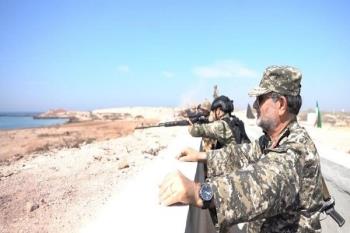British Foreign Secretary Philip Hammond who attended the inauguration at Bahrain’s Mina Salman Port, described it as a watershed moment.
“The beginning of construction work at Mina Salman Port marks a watershed moment in the UK’s commitment to the region,” Hammond said adding that “the presence of the Royal Navy in Bahrain is guaranteed into the future, ensuring Britain’s sustained presence east of Suez.”
The $23 million base is mainly funded by the Bahraini royal family and is said to be part of efforts to help battle extremism as well assert influence in the region.
Yet a country as tiny as Bahrain may not have room for two major powers such as the UK and the US even if they are old allies. Reports have suggested that the reason behind Britain’s move is US plans to decrease American presence in the Persian Gulf and shift its attention to East Asia.
Bahrain has been the playground for US naval activity in the Persian Gulf for 68 years. In 1991, Manama granted US forces access to Bahraini facilities based on a Defense Cooperation Agreement. The Kingdom is also the nerve centre of the US Navy’s Fifth Fleet.
Considering the significance of Bahrain for US presence in West Asia, the UK’s return to the region may be a sign that Washington is looking to be replaced in Bahrain. The reason for this may be traced back to the Iranian nuclear deal which has infuriated Arab states in the Persian Gulf. Having struck an agreement with Tehran over its uranium enrichment program has pit the US against these countries which see Iran as a regional rival and therefore a threat to their interests.
At a security conference in Manama last week, Bahrain's Foreign Minister Sheikh Khaled bin Ahmed Al Khalifa said Iran’s support for anti-regime protesters in Arab states is equivalent to the ISIS terrorist group.
"These actions are no less a threat to us than Daesh [ISIS]," he claimed.
Experts believe that Washington has lost the confidence it once enjoyed in these states leading to the al-Khalifa monarchy’s decision to resort to other powers to remain in power.
The ceremony in Bahrain comes as Britain seeks to fortify economic and military ties in the Persian Gulf the security of which it has committed to ensure.
“The presence of the Royal Navy in Bahrain is guaranteed into the future, ensuring Britain’s sustained presence east of Suez. The new facility will enable Britain to work with our allied to reinforce stability in the Gulf and beyond,” Hammond said.
However, it has been met with opposition by human rights activists who have deplored the Al Khalifa monarchy’s ongoing violations of human rights.
British media has described the Royal Navy base as a reward for the UK’s silence and support over human rights abuses and suppression of freedom of expression in the Persian Gulf state.
Earlier this year Amnesty International published a report in which it concluded that it “monitored human rights developments in Bahrain for many years but never more closely than in the past four years, which have seen widespread violations by government security forces. These have included torture and other ill-treatment of detainees, unfair trials, the imprisonment of prisoners of conscience and unlawful killings, with those responsible all too frequently escaping accountability.”
This time it appears Manama will escape accountability again with western countries such as the UK covering its back to help it continue its crackdown on anti-regime protesters.
Yet it is not only Bahrain that relies on foreign support to stay in power. Countries such as Saudi Arabia and Qatar have also been examples of how regimes are being extended a helping hand in the crackdown against their own people.
Now with the UK building a navy base in what has been called a watershed moment leaves many wondering whether it marks the prolonging of bloodshed in the kingdom of Bahrain.


























